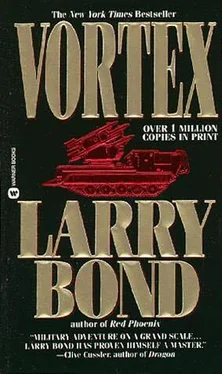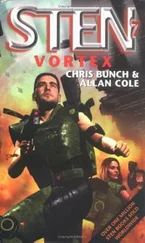Inwardly, Luthuli smiled. So there was a little fire in him after all.
“We are, comrade, but that is not your task. You must organize the evacuation, and quickly. We must live to fight on. I must go now. Good luck.”
As he hung up, the colonel heard the voice protesting, asking for instructions. He shrugged. How much direction did a man need to run?
He hoped there would be friendly faces for his men in Botswana and
Angola. Ever since Broken Covenant, foreign support for the ANC had dried up. Money from America and Europe, even weapons from socialist supporters, had stopped
completely. The Namibian training camps had become mere holding pens as they searched for resources. You can indoctrinate a man with words, but they needed more than that to fight the South Africans.
Luthuli felt bad about lying to him, as well. There had been no attempt to strike back at the advancing Boer armies. Umkhonto we Sizwe was a political army, a resistance group. The typical guerrilla cell was armed with a few pistols and rifles and usually had no more than five men. Heavy weapons, such as machine guns and rocket launchers, had limited ammunition and were saved for important targets. When his men moved, they used borrowed civilian transport, or they walked.
Scattered in small groups all over South Africa, the guerrilla cells spent more time dodging Vorster’s security forces than they did planning and executing guerrilla attacks. And those attacks were always carefully scouted, with planning and practicing that normally took days. Umkhonto could no more hurt the massive South African war machine than a small child could fight with a heavyweight boxer. All of his guerrillas, scattered across the country, probably had no more combined fighting power than a battalion of South African troops.
Luthuli looked at the map in his office, at the documents on his desk. The only men he had left were the survivors of the crackdown that had followed
Vorster’s takeover, the result of Broken Covenant. The “reforms” under
Haymans had proceeded just far enough for the ANC to move into the light, for its members to expose themselves. He had argued against it, fought tooth and nail to keep Umkhonto secret and powerful. Now it lay in shards, most of their leaders and half of their fighters rotting in prison.
Luthuli had not given up. He was a realist, though. Umkhonto’s violence was always aimed at political targets, designed to influence leaders at home and world opinion abroad. Mortaring a military base, bombing a railway station, even a careful assassination, were all designed to show the willingness of the African people to struggle, to answer the Boer’s violence with their own.
None of this mattered in wartime. Five people killed by a bomb on a bus could not compare to the casualty lists coming from the front. Any attack his people made now would simply cause them to be lumped in with the other military enemies. The ANC had been overtaken by events.
Even before the Namibian invasion, Luthuli had faced rebuilding a shattered organization, lacking the money or weapons to even maintain it.
He also lacked political support, since the ANC was viewed by many states as the cause of all the troubles. And even if he could rebuild his forces, they would have to be trained and equipped to fight a much more conventional war. Now he had lost the base camps.
It was time to ask for help, to appeal for more than just supplies and cash. He knew that there would be a price to pay, but if Umkhonto did not receive massive assistance soon, it would cease to exist, and the struggle would die with it.
There was only one country he could turn to for support. They had stayed true to their Marxist beginnings. Even though they weren’t as rich as the
Russians, the fires of revolution still burned in Havana.
He picked up the phone.
AUGUST 19-20TH CAPE RIFLES, ON MOTOR ROUTE 1, FIFTY KILOMETERS SOUTH
OF
KEETMANSHOOP
Smoke from the burning village eddied over the highway, adding an acrid tang to air already stained by diesel fumes and the sickly sweet smell of high explosives. Bodies and pieces of bodies were scattered haphazardly through a tangle of collapsed houses and fire-blackened huts. Some of the corpses were in Namibian uniforms but most were not. A few dazed survivors squatted beside the village well, their faces set in rigid masks of mingled horror and grief.
A futile show of resistance by Namibian police had given Maj. Daan
Visser’s armored fighting vehicles and scout cars the only excuse they needed. Just five minutes of machinegun fire and several HE rounds from 76mm cannon had turned the little Namibian settlement into a charnel house. Then
Visser’s men had roared off northward into the late-mo ming light, leaving the battalion’s main column to clear up the mess and secure any prisoners.
Commandant Henrik Kruger shook his head wearily and turned away, trying to concentrate on the developing strategic situation shown on his map.
Colored-pencil notations showed the last reported positions of all known
South African and Namibian units.
In a nonstop drive since crossing the frontier, Kruger and his men had steamrollered their way west to Grunau. Up a winding pass climbing through the Great Karas Mountains, then north toward the paratroop-held airhead at
Keetmanshoop. More than 280 kilometers in just thirty-six hours. Resistance had been light-almost nonexistent, in fact. Only a few easily crushed pockets such as the police post in this village. The column advancing from
Walvis Bay reported similar progress.
Good. But not good enough. Kruger folded the map with abrupt, decisive strokes and handed it to a waiting staff officer, a babyfaced lieutenant.
They were already eight hours behind schedule-at least according to the wildly optimistic invasion timetables prepared by Pretoria. That shouldn’t have come as a surprise to anyone. Moving long columns of men and equipment over vast distances was always a time-consuming business-even without meeting de ten-nined enemy resistance.
Kruger’s own advance was a case in point. The trucks and APCs carrying his battalion had been on the road continuously for more than a day and a half, pushing north with only scattered five-and ten-minute rest breaks. They were starting to pay a price for that. Exhausted drivers were falling asleep at the wheel or growing increasingly irritable. The result: a rising number of minor traffic accidents and breakdowns, each exacting additional delay. Resupply halts were taking longer too. Tired men took more time to refuel and re ann the it vehicles.
Something would have to be done about that.
With the young lieutenant trailing behind, he moved around to the armored side door of his squat, metal-hulled Ratel command APC. Up and down the length of the long column, other vehicle commanders were already gunning their overworked engines to life. Blue-gray exhaust billowed into the hazy air.
His mind was made up. Once the battalion reached the paratroops at
Keetmanshoop, it would have to halt for at least six hours to rest and recover. He didn’t like it, but he couldn’t see any other realistic alternative. Not that that would leave him with a combat-ready unit. Still, every hour of added delay gave the Namibian Army more time to pull itself together. Plus there were rumors that the Cubans had promised their assistance.
Kruger frowned. That was a disquieting possibility. He respected the
Cubans. They were communists, it was true, but they made tough soldiers nonetheless.
He swung himself back inside the command vehicle’s cramped interior.
Moments later, the column of camouflaged APCs, trucks, and armored cars trundled north again, driving hard for Keetmanshoop and some promised sleep. The shattered village continued to burn behind them.
Читать дальше












